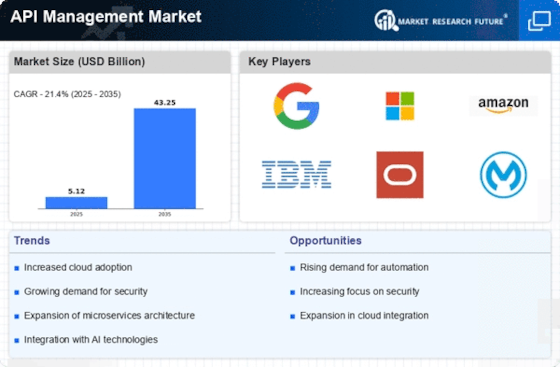Market Analysis
API Management market (Global, 2024)
Introduction
The market for Application Program Interface Management (API Management) is expected to play a key role in the digital transformation strategies of companies in various industries. In the present day, the importance of integration and interoperability has been recognized as a key requirement for business success. The development of cloud services, mobile applications and the Internet of Things (IoT) has created a demand for robust and scalable API management solutions. The increasing focus on API governance, analysis and life cycle management is also driving innovation and competition among the leading vendors in the market. The growth of microservices and the need for agile development methods are changing the API management landscape. The vendors are therefore being forced to offer more sophisticated tools and platforms that meet the changing needs of both business and developers. This report examines the current trends, challenges and opportunities in the API management market, providing a comprehensive analysis that will help inform strategic decision-making.
PESTLE Analysis
- Political
- In 2024, the market for application program interface management will be affected by a number of political factors, such as government regulations on data security and privacy. The European Union's General Data Protection Regulation (GDPR) is imposing strict requirements on companies, with fines of up to 20 million euros or four percent of annual turnover, whichever is higher. Also, the US government is spending $ 1.9 billion on security for its own systems, which indirectly affects the entire industry.
- Economic
- The API Management market in 2024 will be characterized by the growing investment in digital transformation initiatives. According to the report, companies are expected to spend about $ 2.3 trillion on digital transformation, including the use of API Management solutions. In addition, the unemployment rate in the IT industry is expected to be about 3.5%, which will ensure the demand for qualified personnel in the field of API development and management, which in turn will drive the growth of the market.
- Social
- The social trends of 2024 are indicating a greater need for seamless digital experiences, which are pushing companies to adopt API management solutions. Surveys have shown that 78% of consumers expect a consistent experience across all digital platforms. This has led companies to invest in API strategies to improve customer engagement. The trend towards remote work has also increased the use of cloud-based API management tools by 25%.
- Technological
- Among the most important drivers of the market for API management is the rise of artificial intelligence (AI) and machine learning (ML). It is estimated that by 2024, some 60 percent of companies will have added some form of AI to their API management platforms to improve efficiency and security. Furthermore, the use of microservices is expected to increase by 40 percent as companies seek to increase the scalability and flexibility of their application development.
- Legal
- The legal factors that will have an effect on the API Management market in 2024 include the implementation of stricter data protection laws in various jurisdictions. The Californian Data Protection Act, for example, imposes fines of up to $ 7,500 per infringement, which will force companies to ensure that their API Management is in compliance with the law. In addition, the rise in intellectual property disputes concerning software and APIs has led to a rise in legal consultations. Companies have reported an increase of up to 15% in legal costs related to their API Management activities.
- Environmental
- In the field of API management, the consideration of the environment is becoming increasingly important, especially as companies seek to reduce their carbon footprint. It is estimated that by 2024, some 30 percent of companies will be prioritizing sustainable technology investments, including in the field of API management. Also, a 20 percent increase in the use of energy-efficient data center technology has been noted, which directly affects the API management system.
Porter's Five Forces
- Threat of New Entrants
- The API Management market in 2024 faces a moderate threat of new entrants. Despite the rapid growth of the market, established players have a strong position, with advantages such as brand awareness, customer loyalty, and economies of scale. However, technological innovations and the increasing availability of cloud-based solutions have lowered the entry barrier, which has attracted new companies to enter the market with their own products.
- Bargaining Power of Suppliers
- The bargaining power of the suppliers in the API Management market is relatively low. There are many technology suppliers and software vendors who supply the components necessary for the implementation of API Management solutions. There are so many suppliers that the bargaining power of the suppliers is relatively low. The customers can easily change the suppliers or develop their own solutions if necessary.
- Bargaining Power of Buyers
- High—Buyers in the API Management market have considerable bargaining power, owing to the multiple product offerings and the highly competitive nature of the market. The increasing demand for custom solutions and lower prices has forced vendors to continuously enhance their offerings and adopt competitive strategies in order to retain customers.
- Threat of Substitutes
- The threat of substitutes in the market for API Management is moderate. There are alternatives, such as traditional integration methods and self-built APIs, but the growing importance of APIs for digital transformation and interoperability makes these alternatives less attractive. The technology may, however, develop in such a way that new integration methods may emerge and thereby become a potential threat.
- Competitive Rivalry
- Competition in the market for API management is high, with many players competing for market share. The established players and the new entrants are constantly improving their offerings to win customers. Competition is driving down prices and forcing companies to invest in marketing and product development to stand out in the crowded market.
SWOT Analysis
Strengths
- Growing demand for digital transformation across industries driving API adoption.
- Enhanced security features in API management solutions improving data protection.
- Ability to streamline integration processes, reducing time-to-market for new applications.
Weaknesses
- High initial investment costs for implementing comprehensive API management solutions.
- Complexity in managing multiple APIs can lead to operational challenges.
- Limited awareness and understanding of API management benefits among smaller enterprises.
Opportunities
- Increasing trend of microservices architecture creating a need for robust API management.
- Expansion of IoT and connected devices driving demand for scalable API solutions.
- Potential for growth in emerging markets as businesses seek to modernize their IT infrastructure.
Threats
- Intense competition from established players and new entrants in the API management space.
- Rapid technological changes may outpace current API management solutions.
- Security vulnerabilities and data breaches could undermine trust in API services.
Summary
In 2024 the API Management market will be characterized by a strong growth driven by digital transformation and the need for increased security. However, there are also challenges such as high costs and complication in the use of the management system. Opportunities are created by the development of microservices and the Internet of Things, while competition and security threats continue to be a major concern. In order to take advantage of the opportunities that arise, it is necessary for companies to take advantage of their strengths and to strengthen their weaknesses.



















Leave a Comment